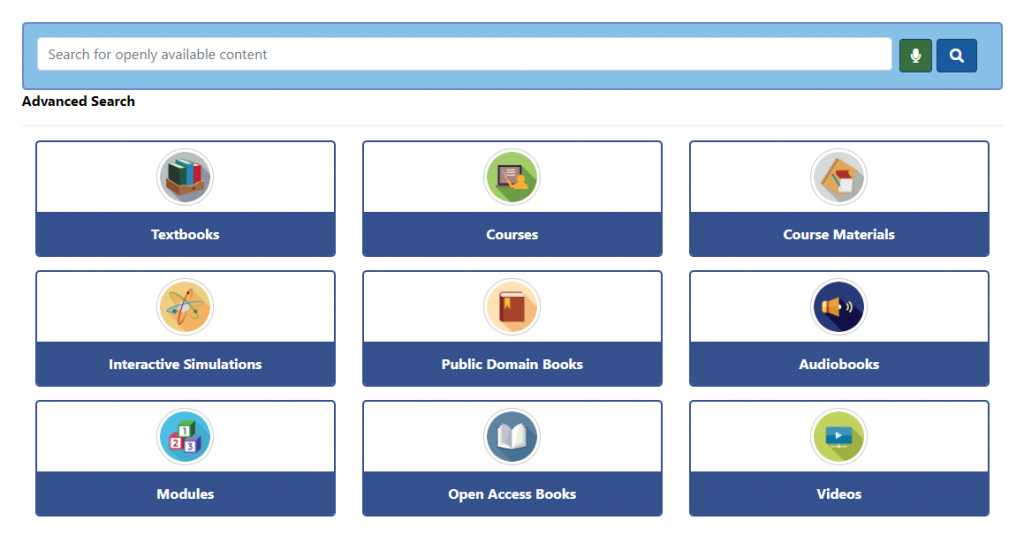Repositories and Search Tools
Learning Objectives
By the end of this section, you will be able to:
- Identify four search tools for finding open educational resources.
- Identify at least two search tools for finding openly licensed media.
In the last chapter, we reviewed some strategies for finding OER. Below, a set of available repositories, search tools, and resources are listed to help you find the right OER for you.
Best Bets
When starting your search for OER, it’s best to begin in a place with a wide variety of options. The websites listed below each have a different focus, but they are good places to start if you aren’t sure what to look for.
- The Open Textbook Library is a great resource for finding open textbooks. If you want a textbook and nothing more, this is the place to start.
- BCCampus Open Textbooks collects resources created, reviewed, or adopted by instructors at British Columbia universities. Materials can be filtered by Accessibility as well as whether they have been adopted by BCCampus courses, include ancillary materials, or have been reviewed by faculty.
- MERLOT is a project that was started in 1997 by the California State University system. The repository includes thousands of resources contributed by members, including original content and links to resources found through other platforms.
- Curated Library Guides, like the Iowa State University Library Guide to OER, can be useful for exploring a selection of open content in your subject area.
Federated Search Tools

SUNY’s Openly Available Sources Integrated Search (OASIS)
OASIS is a search tool that aims to make the discovery of open content easier by searching multiple sources for OER and other open content at once. OASIS currently searches for open content from 79 different sources and contains approximately 330,000 records.
The Mason OER Metafinder (MOM) links to a wide array of open content, including open access books and articles, documents in the public domain, and OER. Because of its large breadth of resources, we recommend that you start your MOM search with only a selection of the “OER-specific sites” checked, rather than all the materials it can include.
Institutional Collections
Institutional repositories (IRs) aren’t just for sharing copies of research articles and student theses. They can also be used to store and share OER. Although not every college shares OER through their institutional repository, the colleges below do share collections of OER specific to their institution:
- Galileo Open Learning Materials (Georgia higher ed institutions)
- OpenMichigan (University of Michigan)
- MIT OpenCourseWare (Massachusetts Institute of Technology)
Subject-specific Repositories
Some open educational resources are shared through subject-specific repositories. A few notable examples of this type, including open publishers that specialize in one discipline, are listed below:
- Chem Collective: Chemistry
- Learn Chem E: Chemical Engineering
- Noba Project Psychology Modules: Psychology
- Center for Open Educational Resources and Language Learning (COERLL): Languages
- Open Geography Education: Geography
- Engineering Technology Simulations: Engineering, Physics
- PhET Simulations: Physics, Physical science, Geology, Chemistry
- SkillsCommons: Career & Technical Education (CTE)
- Green Tea Press Textbooks: Computer Science, Programming (Bayes, Python, MATLAB, Java, DSP)
OER by Course
Some colleges choose to share information about which OER their instructors assign in courses. These lists can give you a good idea of what other instructors in your discipline have adopted and (if they have provided a review), what they think of their adopted resource.
- COOL4ED Faculty Showcase (California universities and colleges)
- Open Oregon Educational Resources (Oregon universities and colleges)
- OPEN NYS Faculty Assessments (New York State universities)
Open Content (not explicitly OER)
Not all open content is made to be used in the classroom, but that doesn’t mean you can’t integrate them into your course. Open access book chapters and openly-licensed media can be great additions to your course.
Open Access Publishers and Repositories
- Directory of Open Access Journals (DOAJ) Open Access journal articles
- Directory of Open Access Books (DOAB) Open Access books
- Project Gutenberg Public domain books and documents
- PubMed Open access journal articles
- Public Library of Science (PLoS) Open access journal publisher
- Open Book Publishers Open access book publisher
CC-licensed Media
- CC Search A federated search tool for finding content available under a CC license
- Digital Public Library of America (DPLA) Public domain images, videos, recordings, and texts
- The Metropolitan Museum of Art High-quality open images from the Met
- Pexels Public domain and CC-licensed photographs and stock images
- Unsplash Public domain and CC-licensed photographs and stock images
- Wikimedia Commons Public domain and CC-licensed images and figures
- Google Image Search Images. Use the Tools/Usage rights button to filter by license
- Youtube Videos. Use the Advanced Search/CC license option to see open content
- Free Music Archive Public domain and CC-licensed music and sound bytes

